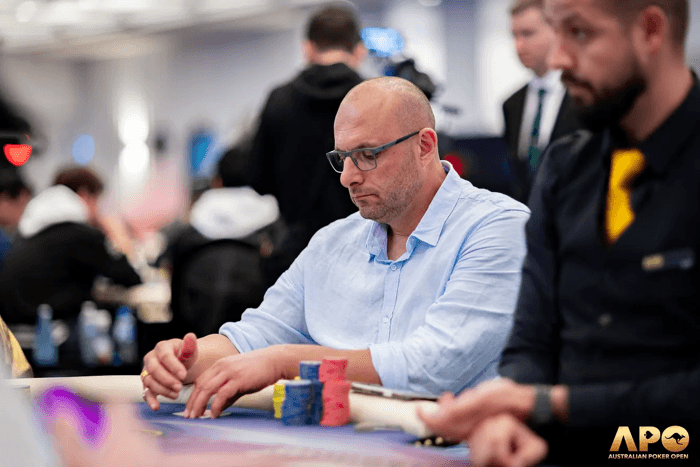lottery Result
Joseph Antar Wins ram slots on motherboard$10,000 The Trojan APO High Roller
Share on Twitter Share on Facebook 4 min read
Table Of Contents
- The Trojan Final Table Results
- Antar Reflects on Victory
- The Road to the Title
The wait was worth it. Four days after the action was paused with six players remaining, Joseph Antar returned to Club Marconi at Doltone House Western Sydney and closed the deal, capturing the 2025 Australian Poker Open A$10,000 Trojan title and a career-best A$250,000 payday.
The event, which attracted 85 entries and built a A$799,000 prize pool, was originally set to finish four days ago but was rescheduled to Saturday. However, because Kahle Burns ran deep in the Main Event, the Trojan finale was pushed back another day.
Antar came into today second in chips but quickly took control, winning two key pots against Weiran Pu that shifted the momentum firmly in his direction. Reflecting on those hands, Antar admitted both pots were "very lucky" for different reasons. In one, he turned a wheel, a hand he said he might not have even opened if he had realized how close he and Pu were in stacks.
From there, Antar stayed composed during heads-up play, even with a big chip lead. Drawing on past experiences where momentum had swung away from him, he stayed mentally sharp and saw it through to claim his first cash in a A$10,000 buy-in event and one of the biggest trophies of his career.
The Trojan Final Table Results
| Place | Player | Country | Prize (A$) |
|---|---|---|---|
| 1 | Joseph Antar | Australia | $250,000 |
| 2 | Noel Jaber | Australia | $177,700 |
| 3 | Weiran Pu | China | $117,800 |
| 4 | Kahle Burns | Australia | $69,800 |
| 5 | Benjamin LeBlond | Canada | $55,900 |
| 6 | Joshua McSwiney | Australia | $41,900 |
| 7 | John Perry | Australia | $33,960 |
| 8 | Anthony Xu | Australia | $27,970 |
| 9 | Najeem Ajez | Australia | $23,970 |
Antar Reflects on Victory
Speaking after his win, Antar said the whole final table felt surreal at times. "The whole board was just a dream," he said, recalling the hand where he turned the wheel against Pu. He also noted that when he jammed against Pu in another big pot, he "had a good hand" but "was happy to see a fold as well."
Heading into heads-up play with a massive chip advantage, Antar admitted that sometimes the pressure can feel even heavier when you're in front. "It’s very much a mental match. You can't get too down on yourself when momentum changes," he said, referencing a recent tournament where a big lead slipped away.

The victory was also a timely one, as Antar described it as a "bit of a series saver." While his series hadn't been terrible, he said, "it hasn't been great either," making this title even sweeter.
With this being his first 10k cash, Antar said it gives him confidence to maybe play a few more tournaments around this stake in the future, although he plans to mainly stick to his roots in cash games.
As for the overall Australian Poker Open experience, Antar couldn't have been more complimentary: "It’s a great setup. It's well run, giving Aussie Millions vibes but a bit smaller. It’s just a great series, perfectly run for poker players."
Plans for celebrating? "I think we’re gonna go out tonight, have some drinks in the city," he said with a grin.
The Road to the Title
The final day wasted no time getting chaotic, with Joshua McSwiney and Benjamin LeBlond both hitting the rail within the first half-hour and both at the hands of Pu. First, McSwiney's short stack went in with ace-deuce but couldn’t outrun Pu’s Big Slick. Then LeBlond, in prime position with ace-ten against Pu’s ace-six, watched in disbelief as Pu spiked a six on both the turn and river to send him packing.
The spotlight then turned to a grudge match between Burns and Noel Jaber. After Burns busted Jaber from the Main Event a few days ago, Jaber had left with a warning: "I'll get you in the high roller." True to his word, he did just that. Burns jammed with king-eight, Jaber snapped him off with ace-ten, and an ace on the flop gave Jaber sweet revenge as Burns bowed out in fourth.

At that point, it looked like Antar and Jaber were scrapping for second place, with Pu holding more than half the chips in play. But poker has a way of flipping the script fast. Antar first won a big three-bet pot by shoving over Pu's turn bet, forcing a fold, then pulled off a dream scenario, turning a wheel with four-three and getting paid big on the river to snatch the chip lead.
Pu and Jaber both managed double-ups to stay alive, but Pu’s luck finally ran out when his ace-deuce couldn’t catch against Antar’s pocket eights, sending him out in third.

Heads-up was almost over before it started. Antar came in with a five-to-one chip lead, stretched it to thirteen-to-one after sweeping the first five pots, and while Jaber found a couple of double-ups to stay afloat, the mountain was simply too steep.
In the final hand, Jaber jammed ace-deuce, Antar looked him up with pocket kings, and five cards later it was all over — Antar locked up the title, the trophy, and a career-best payday.
Categories
Latest News
- Both the referrer and the referred friend can benefit in a number of ways from referring friends to the Groww app. The primary advantage for the referrer is the chance to get compensated for each successful referral. This can include incentives that build up over time, such as cash bonuses or gift cards. Moreover, introducing friends to Groww can assist the referrer in creating a network of people who share their interests in personal finance and investing. 25-05-10
- Players in turn draw a card from either the draw pile or the discard pile, then discard one card. A round ends when a player either sets and runs with all cards and declares “rummy” or sets and runs, discards a card, and then “knocks. Successful rummy requires strategic thinking, planning, and an appreciation of probabilities. By observing the discarded cards of your opponents, you can learn about the composition of their hands and potential strategies. 25-05-10
- When it is your turn to draw a card, you have the option of taking the top card from the discard pile or drawing a card from the draw pile. Which card you draw from the discard pile is a strategic decision that will affect the possibility of a set or run. If the cards needed to complete a set or run are in the discard pile, picking them up will move you toward your goal. On the other hand, if there are no useful cards in the discard pile, or if picking up cards would reveal your strategy to your opponents, you may want to draw cards from the draw pile instead. 25-05-10
- If no other player has placed a single meld at that point, you will score points according to the scores of all the cards in your hand. However, if another player has placed a meld before you knock, you may incur penalty points based on the number of unmelded cards in your hand. By strategically timing your knocks and maximizing your points with melds & knocks, you can increase your chances of winning in rummy. To effectively maximize points, it is important to carefully consider when to place the meld and when to knock. 25-05-10
- Both the user and their friends benefit from the Refer and Earn program. The user's friends gain from joining a reliable investing platform like Groww, in addition to them being eligible to receive rewards for each successful referral. Groww's program aims to increase its user base while rewarding current users for their advocacy & loyalty. Groww offers users an easy and efficient way to make extra money while educating their friends about the advantages of investing. 25-05-10
- On the other hand, if your hand consists primarily of unrelated cards and the combination possibilities are not clear, you may need to focus on drawing new cards to improve your hand. Monitor your opponents. In addition to assessing your own hand, it is also important to pay attention to the cards your opponents are discarding. This can give you valuable information about your opponent's cards and potential strategies, which in turn can influence your opening hand strategy. In rummy, discards play an important role in shaping the flow of the game & can be used strategically to your advantage. 25-05-10
- It is also important to be unpredictable in your actions & avoid falling into predictable patterns that make it easy for your opponent to spot your bluff. Mastering the art of bluffing and using it strategically can give you an edge over your opponents & increase your chances of winning in rummy. In rummy, maximizing points is critical to gaining an edge over your opponents & increasing your chances of winning. 25-05-10
- Rummy is a card game played with a standard 52-card deck, usually with 2-6 players. The object is to make sets (three or four cards of the same rank) & runs (three or more consecutive cards of the same suit) with all the cards in hand. The game begins with each player receiving a hand of cards, with the remaining cards being the draw pile. The top card of the draw pile is turned face up and becomes the discard pile. 25-05-10
- Both the user and the friend get rewarded when they recommend a friend to Groww and the friend registers using the referral link. Not only does the friend may receive a reward for signing up, but the user usually receives a cash bonus or other incentives. The goal of this program is to motivate users to tell their friends about Groww and persuade them to start investing using the app. 25-05-10
- Melding is one way to maximize points in rummy & involves laying out sets or runs from your hand on the table for scoring purposes. By creating a set or run early in the game and placing it as a meld, you can score points for each card in the meld and reduce the number of unmelded cards in your hand. In this way, you can quickly accumulate points and gain an advantage over your opponents who may still have unmerited cards in their hands. Another way to maximize points in rummy is to knock at the right time. Once you have all but one card in your hand, discard the last card & knock. 25-05-10
- Rummy is a card game played with a standard 52-card deck, usually with 2-6 players. The object is to make sets (three or four cards of the same rank) & runs (three or more consecutive cards of the same suit) with all the cards in hand. The game begins with each player receiving a hand of cards, with the remaining cards being the draw pile. The top card of the draw pile is turned face up and becomes the discard pile. 25-05-10
- Players in turn draw a card from either the draw pile or the discard pile, then discard one card. A round ends when a player either sets and runs with all cards and declares “rummy” or sets and runs, discards a card, and then “knocks. Successful rummy requires strategic thinking, planning, and an appreciation of probabilities. By observing the discarded cards of your opponents, you can learn about the composition of their hands and potential strategies. 25-05-10
Contact Us
Contact: bwdy
Phone: 020-123456789
Tel: 020-123456789
Add: 联系地址联系地址联系地址
